What Makes Up the Styling Space?
Most people begin by choosing either a vanity or pedestal sink and building the styling space around it. Below are a few considerations to help you decide which direction is right for you.
The styling space, also known as the grooming space, is composed primarily of the bathroom sink (with or without a vanity), the faucet and elements like the mirror and lighting. This is the space where you most likely complete the majority of your daily beauty and wellness routines, like washing your face, brushing your teeth or applying makeup. It’s a space you want to be organized and easy to use so your routines go smoothly and the day starts off well.
The following styling space guides will help you bring together the pieces to create a look and experience that fits your life.
Most people begin by choosing either a vanity or pedestal sink and building the styling space around it. Below are a few considerations to help you decide which direction is right for you.
The pedestal sink path is often chosen for powder rooms where space may be limited and storage is less of a concern. However, do keep in mind that dual pedestal Lavatories can be an elegant choice for master bath styling spaces as well.
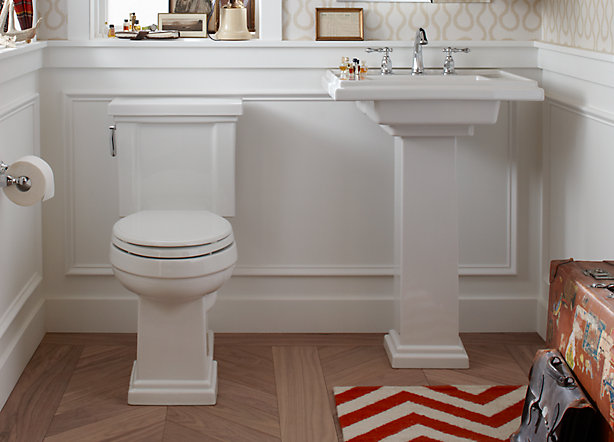
Pedestal Lavatories
Space saving and stylish, many pedestal Lavatories feature wide decks to organize daily essentials.
View the Bathroom Lavatories Guide.
Faucets
Most faucets are compatible with pedestal Lavatories, so you may want to focus on finding a style and finish that complements the style of the sink.
View the Bathroom Lavatory Faucets Guide.
Mirrors or Medicine Cabinets
Pedestal-centric styling spaces are frequently short on storage. A medicine cabinet provides a place to organize and easily access everyday items. However, if you have all the storage you need, a mirror may add just the right amount of style.
View the Medicine Cabinets & Mirrors Guide.
Lighting
The light source for your styling space should offer appropriate task lighting for personal grooming. Sconces on either side or above the medicine cabinet are ideal.
View the Lighting Guide.
Accessories
Towel bars or rings, additional shelves, a soap dispenser–all of these accessories bring a layer of added convenience to a pedestal-centric styling space where storage and organization is at a premium.
View the Bathroom Accessories & Hardware Guide.
If the styling space will be shared, a vanity can help keep everyone’s items separate and organized. When space isn’t a barrier, dual vanities can provide a couple with individual areas, allowing them to get ready together without getting in each other’s way.
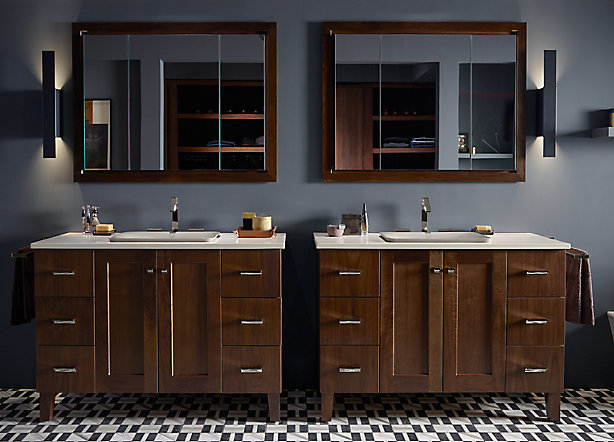
Vanity
Ideal for storing and organizing everything from beauty items you use daily to bathroom linens, vanities make sense in most every bathroom. With petite sizes available, vanities can bring order even to tiny-room chaos.
View the Vanities Guide.
Vanity Tops
Designed specifically to coordinate with vanities, vanity tops are actually an integrated one-piece countertop and sink. They have a seamless design that’s wonderfully easy to clean, not to mention elegant.
View the Vanity Tops Guide.
Faucets
Your styling space will always need a faucet. Because a vanity gives you a wide range of sink options, including lavatories that rest on top of the countertop, you have a broader spectrum of faucets from which to choose.
View the Bathroom Lavatory Faucets Guide.
Mirrors or Medicine Cabinets
If your vanity delivers all the storage you need, a mirror may be just the right amount of added style for your space. However, pairing a medicine cabinet with your vanity lets you keep smaller everyday items separate from larger items that can be stored in the vanity.
View the Mirrored Cabinets & Mirrors Guide.
Lighting
The light source for your styling space should offer appropriate task lighting for personal grooming. Sconces on either side or above the medicine cabinet are ideal.
View the Lighting Guide
Vanity Accessories
Roll-out drawers, electrical strips and outlets, drawer dividers and trays–these accessories help you stay organized and make the most of your vanity.
View the Vanity Accessories Guide.
Accessories
Towel bars or rings, shelves, a soap dispenser–bathroom accessories bring even more convenience to your vanity-centric styling space.
View the Bathroom Accessories & Hardware Guide.
If you have a sense of the scope of your project, the guides can help direct you to the key considerations. There’s no need to spend time deciding between a pedestal and vanity when you’re just adding a towel ring.
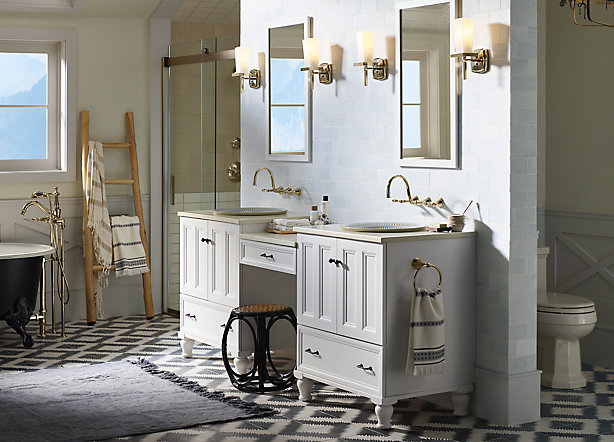
Starting from scratch with a new build or remodel allows you to determine the footprint of your styling space–how much space to dedicate, where to position the plumbing and if you want a pedestal- or vanity-centric styling space. But even if you’re just replacing an existing styling space and your path is identified, it’s best to start by understanding what’s possible and necessary.
Begin by choosing your path and exploring the accompanying buyer’s guide.
Explore the Vanities Guide.
Explore the Bathroom Lavatories Guide.
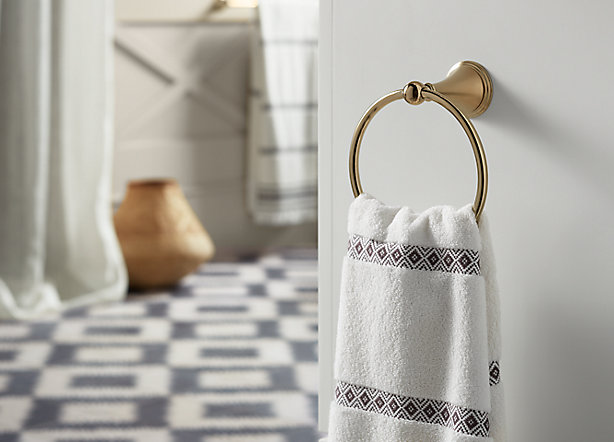
If you’re just looking to beef up the organization of your styling space, general bathroom or vanity accessories can bring more structure to your space.
Measure twice. Install once. These are words to live by. As with any home design project, accurate measurements are the key to success. In the styling space, the vanity and medicine cabinet will require the most planning and measuring. The individual guides will walk you through detailed steps.
Learn about measuring for your vanity.
Learn about measuring for your mirrored cabinet.
Discovering and combining all the right elements to create a styling space that you love to step into every day can be an exciting project. It can also be a tad daunting. If you’d like a few ready-made solutions to simplify your options, here are a few things to keep in mind.
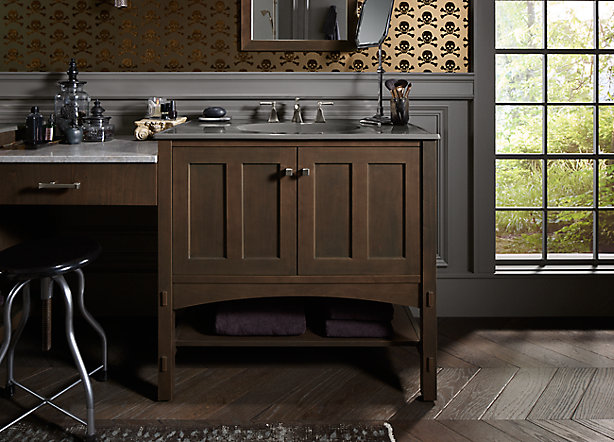
Your styling space is an area that has the potential to bring together a number of varying materials, each with its own color or finish and texture. There aren’t any hard and fast rules for how to coordinate these components. First and foremost, choose what you love. Decide if you want your space to skew warm or cool in tone, and choose colors and finishes within that spectrum. And then try to balance hard and soft textures, so everything doesn’t feel the same. Here are a few palettes to get you started.